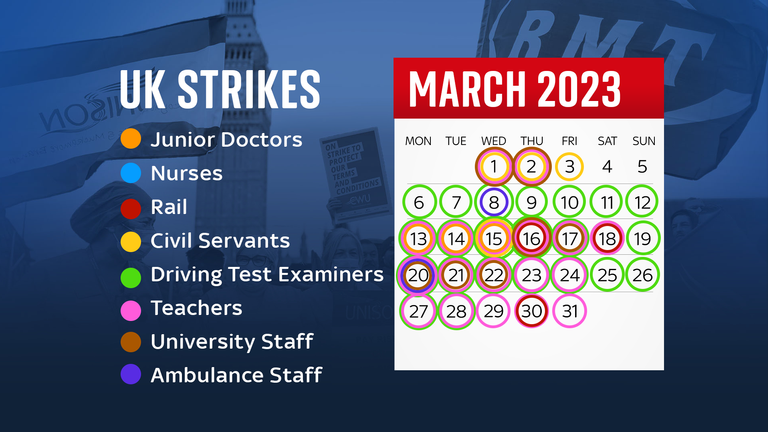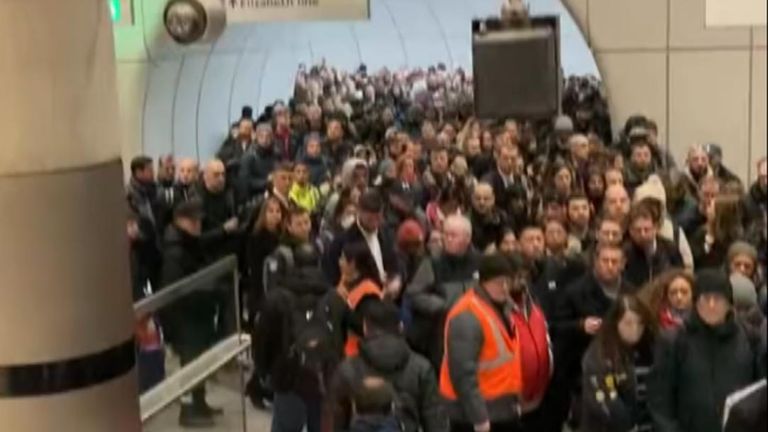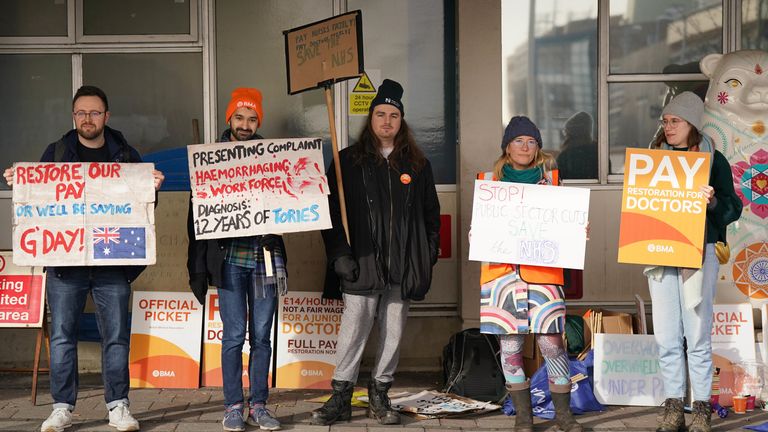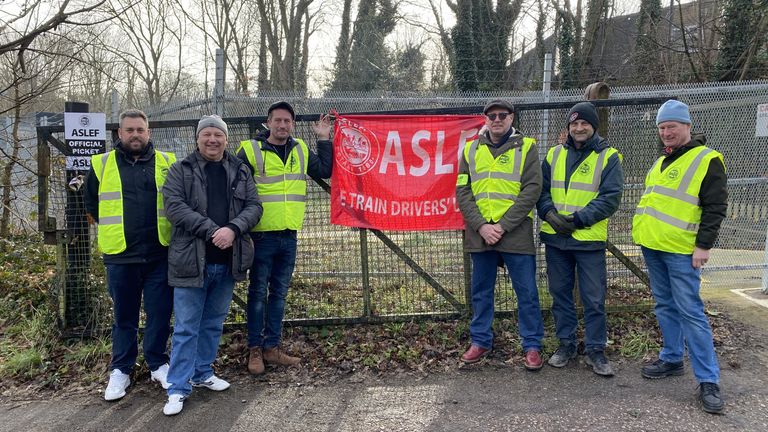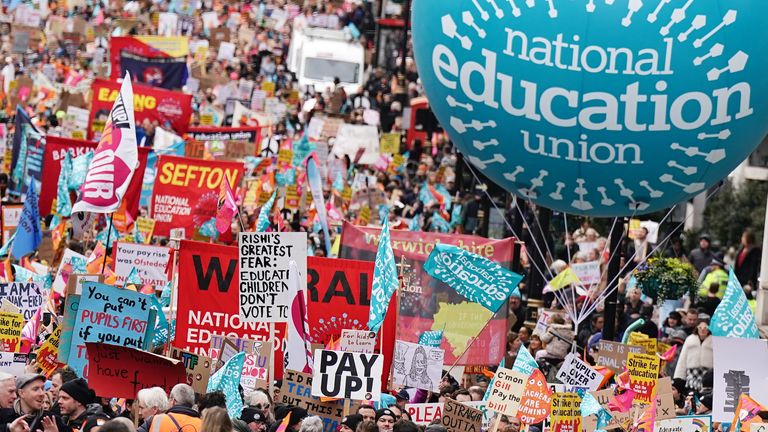
Hundreds of thousands of workers are on strike today in what is believed to be the biggest walkout since the current wave of industrial action began.
Teachers, university lecturers, civil servants, junior doctors, London Underground drivers and BBC journalists are among those taking to picket lines around the country to coincide with budget day.
Members of several trade unions are involved in the action amid widespread anger over issues including pay, jobs, pensions and conditions.
One Border Force official who joined the major protest in London’s Trafalgar Square warned industrial action would grow if the government did not give PCS members the 10% pay rise they are asking for.
David Nicholson, 53, said: “Over the last 13 years, all public servants just have not had decent pay rises.
“It’s not being able to afford the things you should be able to afford and just the fact that the employers and the government don’t seem to care.
“I think the strike action will escalate… Nothing is being done and there have been no offers at all.”
One district organiser for the London Underground train driver union Aslef said the root cause of all the strikes was “the failure by the government to fund the vital public services that people need”.
Finn Brennan, discussing the action affecting the Transport for London (TfL) network, said: “It is not a strike about pay, it is not a strike looking for more time off.
“We simply want TfL to commit to negotiate with us about changes instead of trying to impose changes.”
RMT general secretary Mick Lynch said today’s walkout showed “how determined we are to reach a negotiated settlement to this long-running dispute”.
“Attacks on pensions, conditions and job losses will not be tolerated and the travelling public needs to understand that understaffed and unstaffed stations are unsafe,” he said.
“We will continue our industrial campaign for as long as it takes.”
Read more on the budget:
Budget news – live: Have we seen ‘giveaway to rich?’
Who is taking industrial action in 2023 and when?
No trains were running on any London Underground lines due to the strike by Aslef and the Rail, Maritime and Transport union (RMT) – causing significant disruption.
London Underground train driver Hamza Ansari, 35, said he had been surprised at how supportive members of the public had been.
“It’s amazing – the solidarity, people coming in [and] bringing food,” he said.
“We haven’t met one customer that was annoyed or intimidating. Everyone’s supportive, including normal members of the public that I’ve come across today.
“That’s an eye-opener for me, because when you read newspapers you always think there are loads of people who are against [the strikes]. But when I was passing a local high school I saw teachers there and people appreciating them.”
He added: “I’ve got four kids and a family to run, and if it’s going to impact my pay and my conditions, of course I need to take a stand.”
Some of the strikes, such as those by teachers, are only being held in England – where hundreds of thousands of pupils are having to stay home – as progress has been made in Wales and Scotland.
Mary Bousted and Kevin Courtney, joint general secretaries of the National Education Union, said: “We do not want to go on strike – we want to be in the classroom, teaching and supporting children and young people.
“It continues to be a regret that our members have to take strike action, but we know that parents and the public understand the gravity of the situation around school funding and teacher recruitment and retention.”
Mr Courtney said Education Secretary Gillian Keegan was to blame for the strikes going ahead: “We have suspended our strike action in Wales today and tomorrow because we had a new offer and we’re consulting members on it.
“It is Gillian Keegan who is out of step – she just won’t sit down and talk with us and make offers to resolve the dispute.”
Nadia Whittome, Labour MP for Nottingham East, has donated £3,000 to a strike fund for teachers and support staff in the area.
“Teachers and support staff in Nottingham work tirelessly to give young people the best start in life. Thanks to 13 years of Conservative governments, they are underpaid, overworked and stretched thinner than ever,” she said.
“While the decision to strike will not have been an easy one, this dispute is not only about ensuring that teaching staff can provide for their families in a cost of living crisis, but for the future of our education system which cannot continue to treat educators this way.”
Ms Keegan said in an open letter to parents that she was “extremely disappointed that many young people will once again miss invaluable time learning” and insisted the action was “completely unnecessary”.
Click to subscribe to the Sky News Daily wherever you get your podcasts
Hundreds of striking civil servants chanted during a noisy protest outside Downing Street.
They arrived, many blowing whistles, while Chancellor Jeremy Hunt was delivering his budget speech in the nearby House of Commons.
Public and Commercial Services union general secretary Mark Serwotka, representing civil servants and other public sector workers, warned strikes could last until the end of the year.
“On budget day we’re asking Chancellor Jeremy Hunt to give our hard-working members a fair pay rise,” he said.
“We’ve been given a 2% pay rise when food inflation was 16% last week. 40,000 civil servants use food banks and 45,000 claim in-work benefits because they’re so poor.
“The government can stop these strikes today by putting money on the table for our members.
“Shamefully, ministers don’t seem interested in giving their own employees a fair pay rise to help them through the cost-of-living crisis and beyond.”
Workers’ incomes ‘have fallen 26% in 13 years’
Members of the National Union of Journalists working at BBC Local across England are holding a 24-hour strike in a row over programme cuts.
Meanwhile, junior doctors in the British Medical Association continue a three-day stoppage they launched on Monday over pay.
Mike Clancy, general secretary of the Prospect union, said: “Our members in the public sector have seen their incomes decline by up to 26% over the past 13 years and their work taken for granted – they have had enough.”
He said the government had not yet presented a meaningful offer.


